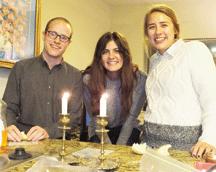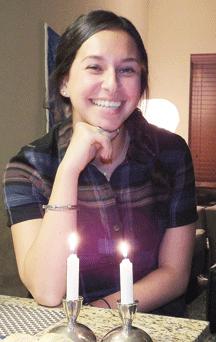
Around four years ago, KU Hillel Rabbi Neal Schuster started collecting candlesticks he would find at estate sales and thrift shops. Every pair he encountered was unique and made differently in different parts of the world, which caught his attention, so he started buying them so he could provide candlesticks to students at KU.
“It struck me, I’m buying these for not that much money — let [students] keep them, not just borrow them once,” Rabbi Schuster said. “I always tell people, ‘Pick well because these are not yours to borrow, these are yours to keep.’ There’s something about that unique pair that [students] connect with.”
Once he started providing students with candlesticks to make Shabbat wherever they were on campus, Rabbi Schuster started what he refers to as his “candlestick adoption program,” allowing students to choose their favorite pair from the shelf of candlesticks at KU Hillel. In doing so, Schuster wants to give students the opportunity to continue lighting candles once they graduate.
“We talk about Hillel and how it’s developing Jewish adults — that really is what the value is,” Schuster said. “I want students to have the ability to [celebrate Shabbat], but I also want them to have that sense of ownership when Friday night comes along and they’re living alone, they want to make Shabbat because that’s what gives them a sense of grounding and feeling at home, so starting that while they’re here and starting that relationship with candlesticks moves in that direction.”
KU senior and Hillel intern Pearl Sonnenschein got involved with Rabbi Schuster’s candlestick program this year as part of her internship. She thought that one way to encourage students to take a pair home with them would be to make an entertaining video similar to the animal adoption ones on TV, adding googly eyes to the candlesticks to make them seem more like a pet someone could adopt.
Sonnenschein said she wanted to make the video funny and appealing to other students because she thinks Rabbi Schuster’s initiative with the program is valuable to herself and her peers at KU.

I think it’s special and it’s important for Jewish students at KU to have a resource to light candles,” Sonnenschein said. “Yeah, you could get the cheap foil ones, but having an actual, physical pair of candlesticks makes Shabbat and lighting candles feel more special.”
Like Sonnenschein, Rabbi Schuster believes every pair has a story — whether it’s where they came from, who made them or who has used them in the past. Whenever Rabbi Schuster finds a new pair of candlesticks, he researches where and how the pair were made. He likes to tell students the history behind their candlesticks to add to the experience of lighting them.
“I don’t think it’d quite be the same if we had a shelf of ordered online, brand new candlesticks. The uniqueness of each one, it means that there’s character,” Schuster said. “To me, I love watching people pick out a pair because you learn a lot about them by what they choose.”
Rabbi Schuster said sometimes he’ll see a pair of candlesticks and they’ll remind him of a specific student because every pair has so much character. The uniqueness allows students to connect with the candlesticks when making Shabbat, but Rabbi Schuster also said it allows for so much more. Shabbat means so much more than just lighting candlesticks because of what comes with lighting them.
“Material objects have meaning when we connect memories to them. It’s not just where it came from, it’s what it means to us,” Rabbi Schuster said. “I like seeing the opportunity for students to develop that relationship, not just with object but also with what comes out of it — of what Shabbat means in their life with the people they celebrate with and knowing that when they leave here they ... at least have what it takes [to make Shabbat].”
After providing candlesticks to students for the past few years, Rabbi Schuster has been able to visit or see pictures of students at their homes when they light the sticks he once gave them. Being able to see students in Kansas City, in various other states and in Israel, light candles in their homes is an experience Rabbi Schuster loves.
“It’s so awesome, I mean it just it gives me chills,” Rabbi Schuster said. “I feel cheesy saying it, but it really is cool. Seeing their excitement about it and the smiles on their faces and that it’s something that they want to share with people and they want to share with me, it just it feels great.”
Rabbi Schuster hopes to continue finding unique candlesticks and would love community members to donate their own objects with the stories behind them because having personal stories behind ritual objects passed down to students make lighting on Shabbat even more special.
Rabbi Schuster, after all, said he finds Shabbat in general a great way to connect with Judaism and feel a sense of calmness at least once a week. With his adoption program, he wants to make sure students also feel that sense of community and connection.
“Ahad Ha’am said, ‘More than the Jewish people have kept the Sabbath, the Sabbath has kept the Jewish people.’ I think that’s so true, whatever a person does, no matter how far away a person gets from their Judaism ... if you take just a few minutes to make Shabbat on a regular basis, you will always have an active connection.”
Hayley Berger is a sophomore at KU.



